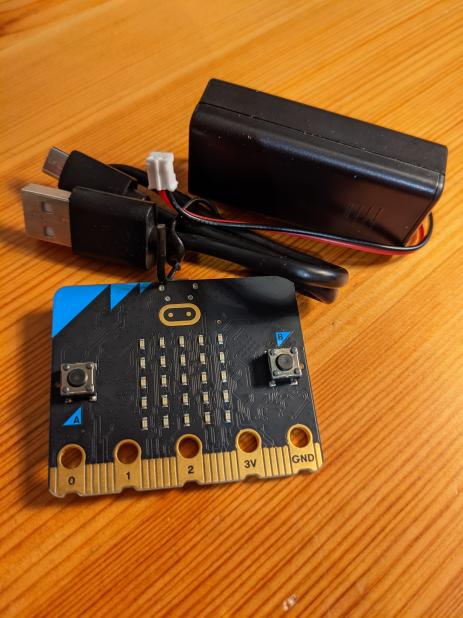

The Micro:Bit is a pocket-sized educational computer, produced by the BBC, to help develop coding and STEM skills from a young age
The aim of this workshop is to demonstrate how these can be used in physics experiments.
To discuss or book this or any of our other workshops, please contact Tally Roberts
Please be aware that the availability of our equipment may be affected by Covid-19 restrictions or re-purposing.
We have a set of 30 version 2 BBC Micro:Bits with power supplies and download cables available for workshops and activities.

If computers are needed, we have 20 laptops available with the necessary programs installed (no internet required).
This workshop includes a PowerPoint Presentation and laminated handouts.
A screen/projector for presenting
If using own computers, then an internet connection is required (unless software has been previously installed for offline use).
Discussion beforehand will be necessary to determine which experiments will be undertaken as part of this workshop. This will also allow us to establish other equipment needs and provision.
This is a 60 minute session.
Shorter extension sessions can be added for additional experiment topics.
We have a range of experiments suitable for years 5-11 (ages 9-16) using the BBC Micro:Bit and block-programming.
These can also be adapted for GCSE experiments upon request.
This can be a stand-alone session, a miniseries of experiments, or part of a larger STEM series.
We have an Introduction to Micro:Bits workshop for learners who have no or very little experience in using block programming.
The programming language used is also very similar to that used in both our Scratch and Turtle Blocks offerings.
If you wish to follow up with other experiment-based activities, we also offer a workshop on The Science of Colour.
We are hoping to develop other workshops incorporating home and lab experiments in the future.
We are happy to offer our support remotely for this workshop, although this will be reliant on you being able to supply the necessary equipment as listed below:
The newest version on the BBC Micro:Bit has a large number of in-built sensors which can feed data direct to a computer where it can be displayed in real-time.
The sessions will all begin with how Micro:Bits can be programmed and used to record scientific data. We then offer to tune the experiment to whatever science topic you are covering.
Example experiments include speed gates, acceleration logging (perfect for parachute testing), temperature gauge and controller, sound monitoring, measuring conductivity of different materials and force testing.